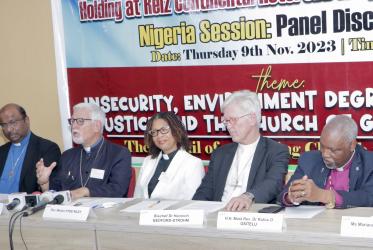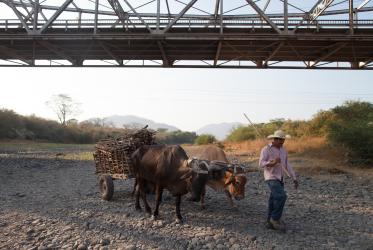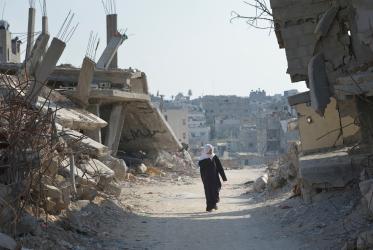At the 17-23 May WCC executive committee meeting, what Biblical verses did you use to head your opening remarks?
Dr Abuom: I used Deuteronomy (1: 6-7): “The Lord, our God, said to us at Horeb, “You have stayed long enough at this mountain. Break camp and advance…”
I also used Psalms 50:15: “Call upon me in the day of trouble; I will deliver you, and you shall glorify me…”
The COVID-19 pandemic has been momentous for humanity and its relationship with God through the churches. How do you see this impacting your work?
Dr Abuom: As a member of this committee, it has been so enriching to be a part of our more visible spiritual journey since last year. I have spent some time thinking about our work together, our everyday challenges and expectations from member churches.
Can you refer to some of what the member churches have raised?
Dr Abuom: The typical questions frequently asked are: When will you elect a general secretary? Followed by: how sure are you that the assembly will take place given the dynamic socio-economic, political, and religious context? Another question from many regions and especially committed ecumenists is: what do you think is the future of ecumenism and, in particular, the WCC?
How did you reflect on these questions?
Dr Abuom: Such questions made me wonder if the COVID-19 pandemic and its positive and negative impact spurred us to ask whether we have stayed too long at Mount Horeb and need to break camp and what this means concretely for the WCC. The ecumenical movement is needed now as at the time of its formation, although present-day challenges may differ from the last century. We need each other as the ecumenical movement and the WCC to be whole. Reflecting on the way forward, offering new forms of partnership and dialogue as an approach at different levels is vital in revamping ecumenism and in addressing pressing challenges.
What did you decide to focus on, and why?
Dr Abuom: Wondering what the focus of my remarks should be this time, the Deuteronomy text and Psalm 50:15 crossed my mind. God expects us to call upon Him during such uncertain and troubled times when the cloud is so thick; the canopy given by the sky is invisible; as well as that take a step of faith and act. Somehow, the symbolism of Mount Horeb hit me and almost paralyzed my thought.
So, what issues did you raise?
Dr Abuom: I looked at our transition. I said we, the WCC central committee leadership, have frequently met, anxious about blurring governance and management boundaries. Fortunately, the line has not been crossed, but we remain vigilant. This committee has done what is feasible within its mandate. Our deliberations have been characterized by whether in-face central committee meetings would be possible to facilitate their sole prerogative decisions.
Did you suggest solutions?
Dr Abuom: I suggested enlarging the scope of reflection: Is it perhaps time to think more broadly, and what would it entail? When we shared the COVID-19 virus information with the WCC leadership in February 2020, it was noted that health issues/WHO decisions can and are politically influenced.
The above-quoted Biblical texts give an image of people deciding whether to remain at this mountain or continue with the journey. Perhaps due to higher evil forces and a sense of uncertainty of the power of the enemy they might encounter, fear leaves them indecisive. The Psalmist reminds them that God expects them to call on Him in such difficult moments. This has been my situation especially, as we have shared possible scenarios of moving forward in the absence of face-to-face central committee meetings.
Did you look at responses to the COVID-19 pandemic?
Dr Abuom: I raised equitable and just access to vaccines. It is argued it might take three years until all people are vaccinated. In addition to expressed concern regarding production, distribution of the vaccine might assume a political power game by bigger nations and even some using quick production of vaccines as soft power. I am aware that this committee will issue a statement. We are further warned to watch out for vaccine diplomacy.
How does this mesh with the Pilgrimage of Justice and Peace?
Dr Abuom: Looking at the Pilgrimage of Justice and Peace – because of the pandemic, we are challenged to reflect on pilgrimage once more. What does it mean to be a pilgrim and undertake pilgrimages that encompass praying, walking and working under COVID-19 conditions? How can we be part of experiencing via the negative, via the positive and via the transformative -- can the North American Pilgrimage of Justice and Peace provide insights? Given the exacerbated mental and other underlying issues and Health and Healing as a focus, how can the WCC, together with churches, establish options for healing?
What are some of the obstacles to healing?
Dr Abuom: Dependence on technology – the phrase ‘Go further-Go together‘ is inviting. Some observers view that the more digital communication and continued meetings 24/7/365, under auspices of the pandemic; we risk becoming dependent and digitally hooked. This is likely to affect the quality of our lives and relationships; already, mobile phones are perceived to contribute to wrecking relations. In what ways do we go further – and together be a movement to improve the quality of fellowship and relations while minimizing risks? We surely need to go together.
Are children facing healing obstacles under the pandemic?
Dr Abuom: There must be a safe space for children under the pandemic, such as efforts for children’s safety through government decrees on what they can do and where they can go are in place. Or, for that matter, when and how they should learn as they observe lockdowns and curfews; critical voices of children; space to share their own experiences and stories of the pandemic are not highlighted. Governments have hardly consulted parents, religious communities or even teachers. At least from my place, digital services for children offer little if any new ways of spiritual and worship experience. We are challenged to support innovative churches by sharing resource materials, especially from our programme on the safety of children in public and worship spaces, as we encourage churches to be sensitive to children’s needs and have a say and participate.
Can you speak of opportunities to help resolve this situation?
Dr Abuom: To deal with the deepening cleavage, let us envision a situation where technological opportunities for engagement are broadened and deepened horizontally and vertically. Already many young people are networked and technologically savvy. But what would it require of us to enhance the connections with a clear focus and perhaps secure current and next generations’ participation and commitment to be ecumenists? What content and processes would emerge? What can leaving camp mean for churches and the ecumenical movement?
Is there a place for the ecumenical movement in this scenario?
Dr Abuom: On the WCC vision of unity, I believe that the ecumenical movement remains necessary in a time such as this when the world remains divided along racial, gender and economic lines, along with the ravaging of communities by the pandemic. The WCC and strategic themes may again be tested to determine validity and appropriateness. Fellowship -- reflection on potentially severe disruption of the fellowship, the nature and scope of convening role and power of WCC, which remains necessary—is vital.
Can you explain more about the notion of unity?
Dr Abuom: In many churches – unity in diversity – there are times when my dilemma on unity is apparent. If we seek unity in diversity, is an increase in member churches a matter of joy and celebration or concern? A case in point is a national council that has, over the years, admitted many smaller churches. They became critical in decision-making because of the power of numbers. They wished to provide leadership that could edge out founding members who have the power of the purse and capacity. This reminded me of the reason for the call of the Special Commission in the 1998 Harare WCC assembly.
Can you name some of the calls made in Harare?
Dr Abuom: There is the ecumenical boat – WCC has made an impact in steering the ecumenical ship and ensuring that others get on board through thematic pillars. These include unity, mission, justice and diakonia. The Pilgrimage of Justice and Peace has expanded interfaith dialogue in peace-building. However, as the boat has proceeded, its visibility by many seems foggy. Is the COVID-19 pandemic contributing to the thin ecumenical memory? And how do we recover?
Yes, how do we recover?
Dr Abuom: Wholesome - ecumenical movement, churches and communities are critical factors. The ecumenical movement and WCC modus operandi in the past 70 years have mainly been conferencing, meetings, and travel as an expression of solidarity with others, especially in difficult contexts. This is increasingly not viable. Perhaps a dilemma to consider is the ripple effect approach that offered limited participation and was rather demanding on members beginning from national, regional, and global levels. New forms of partnership may be plausible whereby the local, regional, and global contexts are full of blooming flowers as an expression of unity in diversity. This approach is different from the present ripple model; instead, it is a method that facilitates the wholesome expression of the movement at each level and space, in interactive relationships with the other.
So, how did you conclude with the WCC executive committee?
Dr Abuom: I sincerely thanked the committee for listening and support. I said, “Let us ask ourselves as we move into the future, are there areas we have overstayed –- what are these mountains? Is there a rationale for breaking camp and opening new spaces — and what would those likely be? Through the lenses of history, we will be analyzed and asked how we contributed to the present and next generations. As we proceed to the next assembly, what are we bequeathing the ecumenical movement that ensures the vitality and continuity of WCC and the ecumenical movement? We look to God for guidance and to remove fear!”
Learn more about the WCC executive committee






